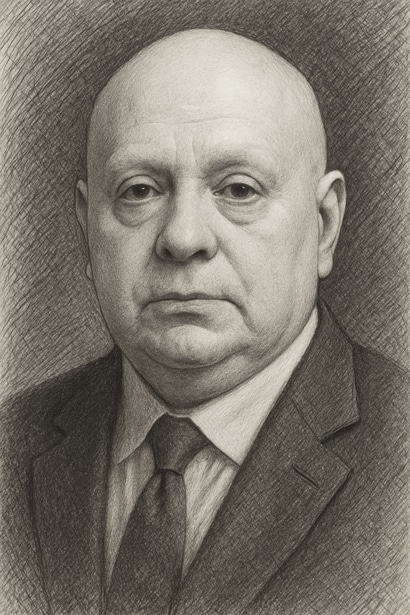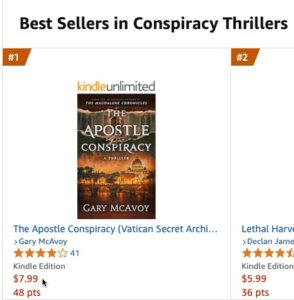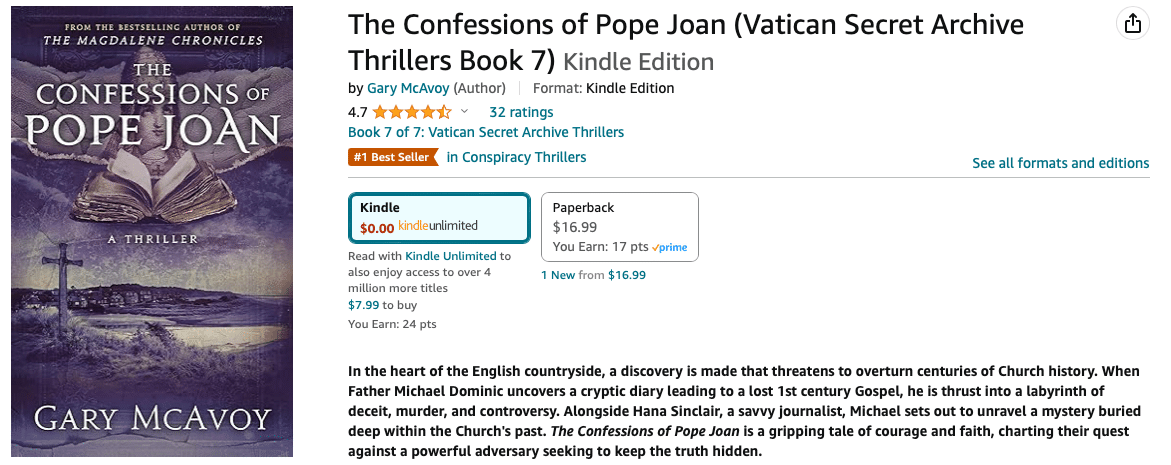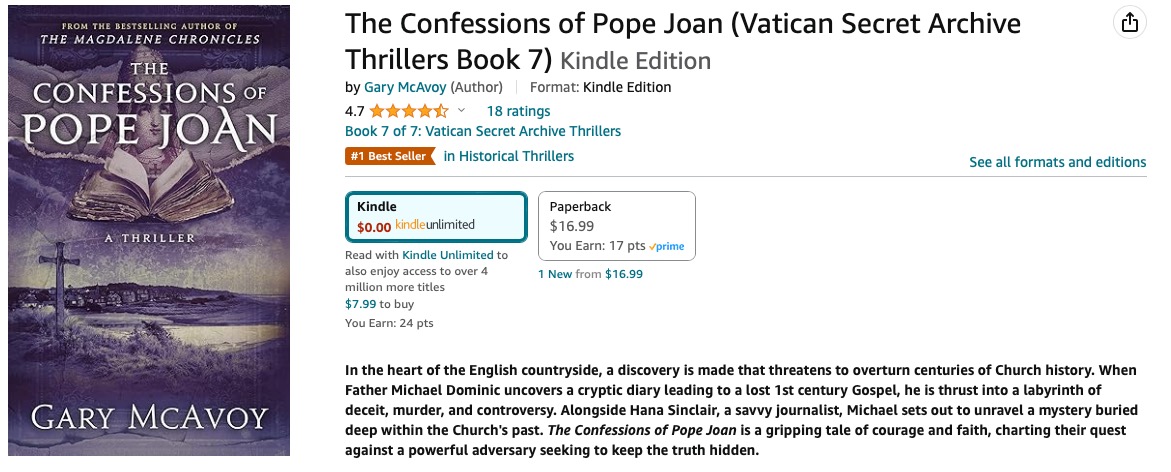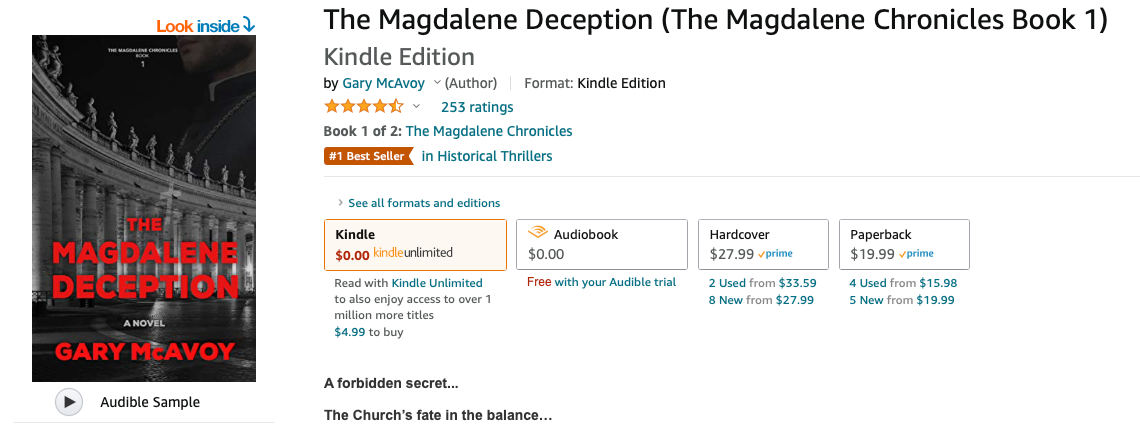Cast of Principal Characters
Many readers have asked for the backstories on the main characters of my stories, and like us, I imagine they do have former lives before appearing on the pages of my books. Here’s a brief look at each of them, along with sketches of how I perceive each of them in my mind’s eye.
Father Michael Dominic
Father Michael Patrick Dominic, Prefect of the Vatican Secret Archives, is an intellectually gifted and deeply empathetic protagonist whose quiet courage and insatiable curiosity propel him into the hidden mysteries of history and faith. A devoted scholar and meticulous archivist, Michael thrives within the intricate labyrinth of Vatican lore, carefully deciphering ancient manuscripts, cryptic texts, and suppressed theological secrets. His unwavering commitment to historical accuracy and moral clarity frequently positions him against powerful institutional forces, placing him at the heart of profound ethical dilemmas that challenge his personal beliefs and spiritual foundations.
Balancing intellectual rigor with compassionate humanity as a member of the Jesuit Order, Michael possesses an intuitive empathy that allows him to connect authentically with individuals from all walks of life. He is guided by an internal moral compass that navigates the complex and often treacherous waters of the Vatican’s power structure, demonstrating both diplomatic skill and principled integrity. Michael’s reserved and subtle humor—often expressed through wry observations or gentle teasing—underscores his genuine warmth and approachability, making him both relatable and engaging.
Michael’s closest friend and confidant, investigative journalist Hana Sinclair of Paris’s Le Monde newspaper, plays an integral role in his journey. Together, Michael and Hana explore the compelling intersections of intellectual partnership and emotional vulnerability, bringing a humanizing dimension to Michael’s complex persona. Their combined courage, insightful collaboration, and mutual respect serve as the emotional and intellectual core of Michael’s quest, deepening his narrative and highlighting the genuine stakes involved in uncovering hidden truths.
Throughout his adventures, Michael also relies on steadfast allies such as his loyal assistant Ian Duffy, the tech-savvy Sister Teri Drinkwater, and devoted Swiss Guards Karl Dengler and Lukas Bischoff, whose bravery and loyalty underscore the profound risks and challenges of their missions. Frequently confronted by adversaries such as the powerful modern-day Medici descendant Alessandro de’ Medici, Michael is driven to confront corruption, secrecy, and institutional abuses, often placing him directly in danger’s path.
Father Dominic’s journey exemplifies the timeless struggle between institutional loyalty and personal conscience, tradition and revelation, and the ethical complexities inherent in the pursuit of truth. His meticulous nature, moral courage, and reflective spirituality embody a compelling exploration of how genuine faith often requires questioning, reflection, and courageously confronting difficult realities rather than passively accepting established dogma.
Ultimately, Michael symbolizes the transformative power inherent in the fearless pursuit of knowledge, justice, and ethical clarity. His story resonates with readers through its profound examination of faith, integrity, and human connection, offering a deeply philosophical yet emotionally resonant portrayal of a scholar whose courage in questioning truths makes him an unforgettable protagonist.
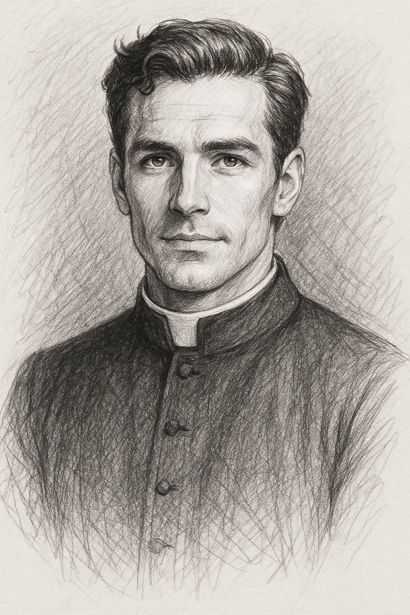
Hana Sinclair
Hana Sinclair, an acclaimed investigative journalist for Paris’s renowned newspaper Le Monde, is an exceptionally intelligent, fiercely independent protagonist whose determination and integrity consistently draw readers into her relentless pursuit of truth. Fearless in her approach and unwavering in her commitment to transparency, Hana navigates the shadowy realms of powerful institutions, historical mysteries, and clandestine conspiracies, often at considerable personal risk.
Hana’s strength lies not only in her keen investigative abilities but also in her intuitive skill for unraveling complex puzzles, deciphering cryptic historical manuscripts, and revealing hidden meanings behind enigmatic artifacts. Her relentless tenacity, resourcefulness, and an unwavering ethical core make her an indispensable ally and trusted partner to Father Michael Dominic, the Prefect of the Vatican Secret Archives. Together, they form a powerful intellectual partnership, skillfully blending rigorous analysis and emotional vulnerability, highlighting the deeply human stakes involved in their joint ventures.
Though her professional life is filled with intrigue and high-stakes revelations, Hana’s personal journey adds a compelling layer of complexity. Despite her resolute independence, she finds herself increasingly drawn to a man who remains emotionally elusive and seemingly unavailable, complicating their partnership with subtle yet undeniable tension. Her deepening friendship with Michael Dominic, built on mutual respect and shared experiences, underscores her own emotional vulnerability, adding poignant depth to her character and creating nuanced dynamics that captivate readers.
Beyond her work alongside Michael, Hana’s character thrives through meaningful interactions with allies such as the steadfast assistant Ian Duffy, the insightful Sister Teri Drinkwater, and the protective Swiss Guards Karl Dengler and Lukas Bischoff. Her relationships reveal her compassionate, empathetic nature, as well as her insightful understanding of human motivations, allowing her to connect genuinely with those around her, even amid danger and moral ambiguity.
Frequently confronting adversaries determined to suppress inconvenient truths, Hana’s courage under pressure and commitment to journalistic integrity exemplify her strength and resolve. These qualities highlight her ability to stand firm even when faced with threats from powerful institutions and shadowy individuals intent on concealing history’s hidden narratives.
Ultimately, Hana Sinclair embodies the modern intellectual heroine, skillfully navigating complex intersections of history, morality, politics, and personal relationships. Her quiet yearning and nuanced emotional struggles lend authenticity and warmth to her portrayal, offering readers a captivating glimpse into a woman whose determination to uncover the truth often intersects with complicated feelings toward someone whose heart she fears may never be fully hers. Her story remains an inspiring testament to bravery, resilience, and the profound courage required to illuminate even the darkest corners of power.
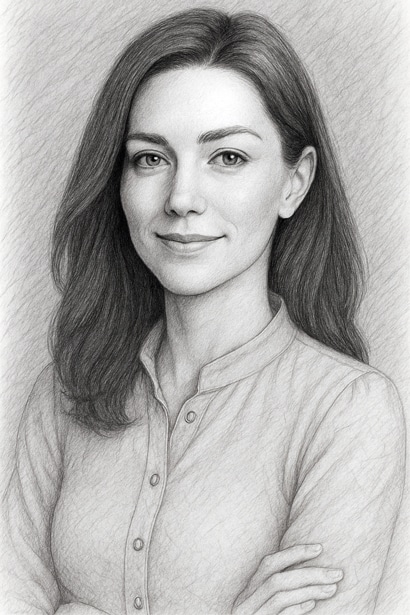
Karl Dengler and Lukas Bischoff
Karl Dengler and Lukas Bischoff, members of the Vatican’s elite Swiss Guard, form an inseparable duo whose bravery, loyalty, and deep bond resonate profoundly throughout the narratives in which they appear. Tasked with protecting Father Michael Dominic and Hana Sinclair as they navigate a world filled with historical conspiracies and powerful antagonists, Karl and Lukas are far more than mere protectors—they are trusted allies, courageous defenders, and compelling characters whose humanizing presence enriches every scene they inhabit.
Karl Dengler, the senior of the two, embodies a steadfast resolve coupled with mature wisdom. A man defined by quiet strength, meticulous discipline, and an intuitive sense of duty, Karl is both a natural leader and a calming presence amid turmoil. His reserved demeanor often masks profound emotional depth and sensitivity, qualities most evident in his protectiveness toward his partner, Lukas, as well as toward Michael and Karl’s cousin, Hana. Karl is deeply principled and unflinchingly dedicated, driven by an internal moral compass that consistently guides him through intense moments of danger and moral ambiguity.
Lukas Bischoff, younger and spirited, is characterized by courage, resourcefulness, and a charismatic energy that complements Karl’s steady presence. Known for his gallows humor and wry wit, Lukas often provides levity in even the most perilous circumstances, his humor serving as both a coping mechanism and a means to uplift those around him. Yet beneath his outward bravado and humor lies a genuine vulnerability, evident when confronting the realities and personal costs of their dangerous missions.
Together, Karl and Lukas forge a profound partnership marked by mutual trust, respect, and unspoken understanding. Their bond, subtly but unmistakably portrayed, hints at a deeper relationship characterized by genuine affection and personal commitment, rendered with a nuanced subtlety that enriches the narrative without overshadowing it. This aspect of their relationship adds emotional complexity and a human dimension to their characters, emphasizing their humanity beyond mere military discipline and professionalism.
Throughout their adventures alongside Michael and Hana, Karl and Lukas consistently demonstrate tactical intelligence, quick-thinking adaptability, and physical bravery. Facing adversaries whose threats often place them directly in harm’s way, they exhibit both professional excellence and genuine personal courage. Their presence underscores the very real dangers faced by those uncovering suppressed historical truths and institutional secrets.
Karl’s protectiveness over Lukas, especially following injuries or dangerous confrontations, provides poignant insight into their characters and enriches the emotional texture of their roles. Lukas, resilient and stubbornly brave, often downplays his wounds to shield Karl from worry, further illustrating the depth of their interpersonal dynamics. These moments of tenderness, care, and camaraderie serve not only as emotional touchstones but also highlight the human costs of loyalty and bravery in the face of persistent peril.
Ultimately, Karl Dengler and Lukas Bischoff stand as compelling examples of dedication, courage, and humanity amid extraordinary circumstances. More than mere guardians, their roles embody themes of sacrifice, honor, personal integrity, and the complexities of emotional bonds forged under relentless pressure. Readers find themselves deeply connected to their journey, recognizing in them the quiet heroism and profound emotional resonance that make their story an unforgettable part of the larger narrative tapestry.
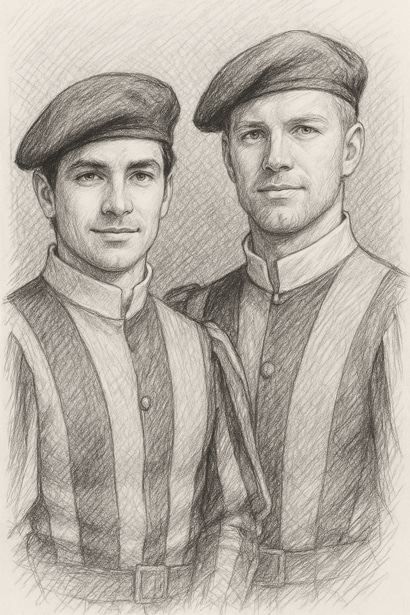
Marcus Russo
Marcus Russo, the Vatican’s Chief Archaeologist, is a man whose life is defined by the deep, unshakable pull of history. In his early fifties, Russo possesses a rugged, unstudied handsomeness—clear hazel eyes, a lean angular face framed by salt-and-pepper hair, and a tall, athletic frame honed by decades of demanding fieldwork. His appearance speaks of long days in the sun, in ruins and deserts, excavating the past one fragile fragment at a time.
For much of his career, Russo’s attire has been purely practical—dusty boots, rolled-up shirts, and the well-worn leather satchel that is never far from his side. That satchel, scuffed and weathered, has carried everything from ancient tools to delicate papyrus scrolls. Even Russo’s hands tell his story as much as his face: calloused and strong, they are equally adept at brushing away centuries of dirt from an artifact as they are at sketching site plans or drafting meticulous reports. Beneath his composed, professional demeanor lies a man profoundly shaped by the weight of history—not only its treasures, but also the darker truths often buried alongside them. His work has taken him from Etruscan tombs in central Italy to forgotten Christian shrines deep in the Middle East, each discovery reinforcing his reverence for the past.
Though not of the clergy, Russo shares a quiet faith and an abiding respect for the Church’s mission of stewardship over sacred relics. For him, the privilege of serving as the Vatican’s chief archaeologist is not measured solely in prestige, but in the responsibility to preserve humanity’s heritage for generations yet to come. In his eyes, the artifacts are not mere objects; they are voices from the past, demanding to be heard, understood, and protected.
Colleagues know Russo as both a scholar and a man of action. He can speak fluently in the language of academic conferences, yet he is equally at home navigating the shifting sands of a North African dig or the intricate politics of artifact repatriation. His career has made him an invaluable figure within the Vatican—an investigator of the ancient world whose loyalty to history and truth remains absolute, even when those truths prove inconvenient.
In Marcus Russo, the Vatican has more than an archaeologist—it has a guardian of history, a man driven by the conviction that the past, in all its beauty and brutality, must never be forgotten.
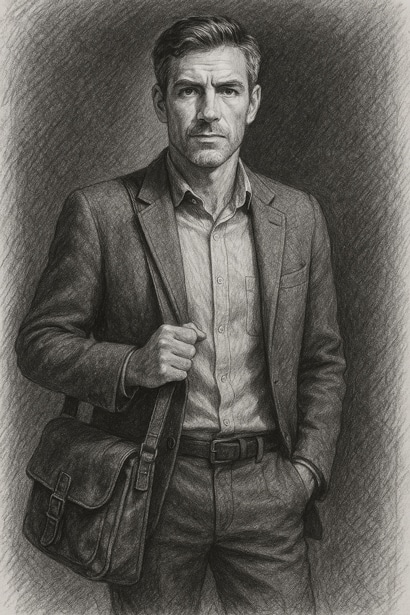
Simon Ginzberg
Born in Berlin, Germany, in 1937, Dr. Simon Ginzberg began a fretful life just after the start of World War II. In the late 1930s, the Nazi regime had brought radical social, economic, and communal marginalization to the German Jewish community. In the aftermath of the Nazis’ Kristallnacht pogrom in November 1938, Simon and his parents were arrested and sent to Dachau concentration camp northwest of Munich, where the young boy spent most of the first eight years of his life behind a barbed wire fence.
A bright, alert child, quick to pick up on the nuances of human nature, Simon learned much about people in that time. He witnessed the strength of courage and survival against all odds, especially in his parents, who were assigned the filthiest of jobs in the camp and still kept a hopeful attitude. He also took in the depths of brutality, watching how the Nazis treated his fellow Jews.
Toward the end of the war, with rumors circulating that Allied powers were closing in on Germany, hope rose in the hearts of Simon’s parents. But they would never live to see their son grow up. On the day he turned eight years old, Gert and Arnold Ginzberg were taken to the gas chambers, then to the ovens where their bodies were cremated. It was only a matter of days later when the Nazis rapidly abandoned the camp as Allied troops descended over Germany.
After he was rescued, young Simon was reunited with relatives in Italy, where he was raised and educated in his favorite subjects: Ancient History, specializing in the Middle Ages and the Crusades, and Paleography, the study of ancient writings. In time he became a tenured professor, settling in at Teller University in Zagarolo, Italy.
Apart from his medieval interests, Dr. Ginzberg has a particular project he’s been working on for years: the absolution or exculpation of Pope Pius XII’s Nazi-related activities in his reign as Pope during the war. Ginzberg’s work is fair and unbiased; he just has a driving need to know and to teach others not to forget the lessons of those who have come before and the events that shaped them.
Owing to his special expertise—and the fact that he’s a scholar-in-residence at the Vatican Secret Archives—Ginzberg often serves as a mentor to Father Michael Dominic, helping him analyze and interpret ancient documents the two of them work on in the course of Dominic’s adventures.
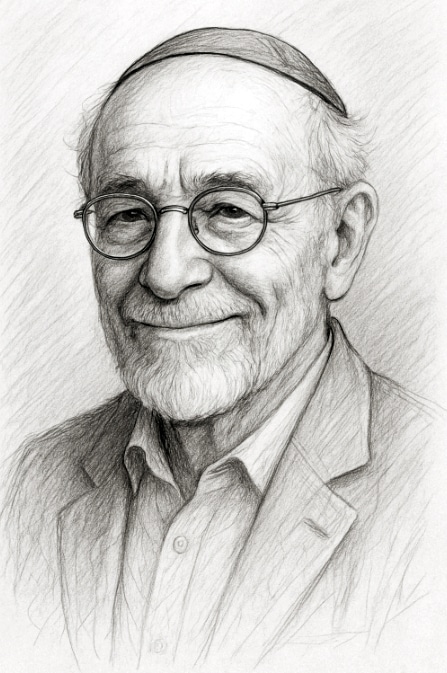
Cardinal Enrico Petrini
As the bombs fell around him and his fellow soldiers during the Normandy invasion, young Lieutenant Enrico Petrini prayed to God that if he were to make it out of the war alive, he would dedicate the rest of his life in service to Him.
Enrico came from a long and noble family whose roots could be traced directly to the 15th-century House of Habsburg, one of the most prominent royal houses of Europe. He was just a teenager when World War II broke out. His father, a diplomatic attaché to the American embassy in Rome, used his connections to get his son a job at the Italian embassy in New York City. It was there Petrini was recruited by the U.S. Office of Strategic Services—or OSS, precursor to the CIA—to serve as a covert intelligence officer, and not long afterward he was working with both British Special Operations branch and French Intelligence in a clandestine action known as Operation Jedburgh. There were roughly 300 Jedburgh operatives, each specially selected for providing liaison between Resistance guerrillas and Allied forces in war-torn Europe, including the coordination of airdrops of arms and ammunition to liberation fighters.
The “Jeds” were organized as small and efficient threeman teams as part of the fabled Maquis, a shadowy arm of the Resistance. Petrini’s “Team Hugo” was comprised of himself as commander, Armand de Saint-Clair as executive officer, and Pierre Valois as the team’s radio operator. Following the war Saint-Clair went back into the family’s banking business, and Pierre Valois emerged as a hero of the French Republic for his work with the Resistance, entering the political arena where he was later elected president of France.
Good to his word, after the war ended Enrico Petrini became a priest. His first posting came as pastor for a small parish in the Queens borough of New York, where he spent fifteen years preaching to his neighborhood congregation before attaining the role of Archbishop of New York.
All this time he continued to provide care and comfort to his housekeeper Grace Dominic and her young son Michael, guiding the young boy into manhood and setting him on his own course to the priesthood.
As an American archbishop to the second-largest Catholic archdiocese in the US, Petrini held great power and influence in the Church, and owing to his amicable nature and ability to raise funds, popes and other cardinals often acceded to his wisdom.
Petrini was a man to watch, a certain candidate for the papabile, for his path to being Pope someday was virtually assured.
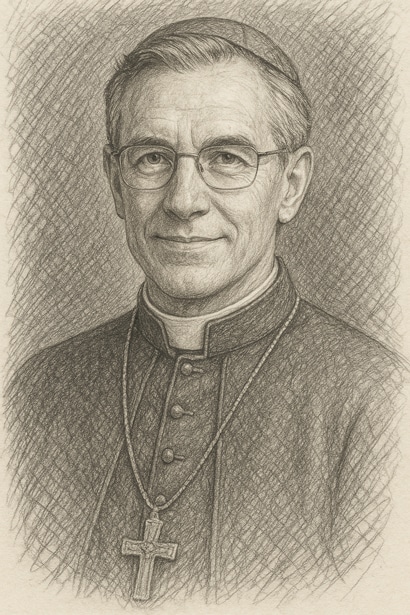
Armand de Saint–Clair
At the beginning of the eighteenth century, Baron Armand de Saint-Clair’s ancestors founded and had since controlled one of Switzerland’s most prominent banks, Banque Suisse de Saint-Clair, concurrent with the emergence of that country’s earliest banking laws regarding secrecy.
The Geheimsphäre, or “sphere of secrecy,” was chief among bedrock Swiss democratic principles. Extending the privilege of such privacy to the banks of this small, ostensibly neutral country also served the needs of Europe’s wealthy for a cloaked, secure resting place for assets which were deemed by their owners as being within easy reach despite whatever shifting political rule their own countries might be suffering at the time—from the Huguenots fleeing religious persecution by Catholic kings, to hiding the royal property of France’s Bourbon dynasty on the heels of the French Revolution.
Naturally, Armand grew up under great wealth and privilege, and trained early in life to one day take over the great responsibilities of running the family business. The young Baron de Saint-Clair’s banking acumen, bolstered by his family’s considerable influence, positioned him well among the financial elite of Europe during the war, and despite countless risks, he deliberately used that influence, and his bank, to quietly safeguard a veritable river of Jewish gold and currency assets flowing into Switzerland. Had the Nazis known this activity was taking place, Hitler would surely have taken steps to nationalize the Swiss banking system under control of the Third Reich. It was a bold risk for Saint-Clair, but a successful one.
His granddaughter, Hana Sinclair, is the joy of his life—despite her inclination to “unburden” herself of the great family name. Apart from that, Armand was happy to accommodate Hana’s career and adventurous spirit when called upon, which was often.
Saint-Clair’s manservant, Frederic, serves his master in many roles: as valet, butler, flight attendant on the baron’s private jet, and bodyguard when needed. He managed all estates and matters pertaining to the many properties owned or controlled by the baron, and did so most assuredly without oversight. For some twenty years he and Saint-Clair had developed a simpatico relationship, such that one could not survive well without the other.
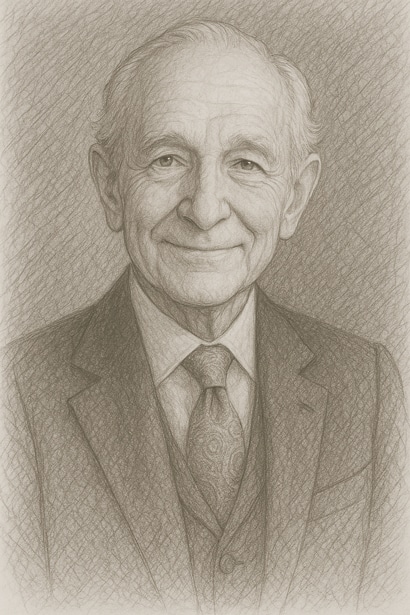
Pierre Valois
A true man of the people despite his aristocratic roots, Pierre Valois had become Général d’armée, general of the French Army, before being elected president of the French Republic in his late eighties. He was reelected after his first five-year term, and is now enjoying his second and final term as the leader of France.
In his youth, he discreetly served in the French Resistance alongside his lifelong comrades Enrico Petrini and Armand de Saint-Clair, the three of them comprising the Maquis’ “Team Hugo” unit during Operation Jedburgh, with Valois serving as the unit’s radio operator.
A witness to war for most of his life, Valois was a strong advocate for peace, often coordinating summits in Paris and other European capitals along with fellow world leaders to reduce nuclear armaments and strive for unity amongst all countries. It was a daunting challenge, especially when dealing with Second and Third World nations who also wanted nuclear arms as a “deterrent to invasion.” Owing to his close friendship with Armand de Saint-Clair, Valois served as godfather to Hana Sinclair, which naturally gave her fairly carte blanche access to one of the world’s most powerful leaders—one who could help move mountains when it was needed.
One of Valois’ personal passions was making fine wine. His family owned a prominent French vineyard in Provence, one where he vacationed from time to time, working the vines himself and participating in the harvesting, crushing and pressing of grapes for his beloved Côtes de Provence rosé. An old man now, it is to Provence where he will retire when his term is up.
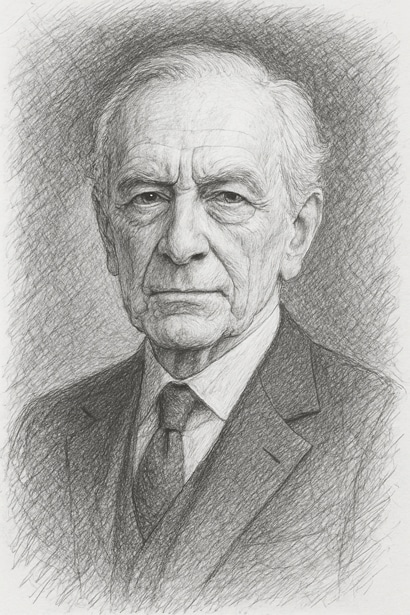
Marco Picard
Marco is a striking presence—handsome, disciplined, and quietly intense. A former member of France’s elite Commandos Marine, he now serves as chief of personal security for Baron Armand de Saint-Clair. When the Baron’s granddaughter, Hana Sinclair, is drawn into danger through her investigative work, Marco is assigned to ensure her safety—often appearing just in time, much to Hana’s initial irritation.
Though she resents being watched, Hana can’t help noticing Marco’s composed strength and quiet confidence. Their reluctant partnership, forged under fire across various global missions, soon evolves into something more emotionally charged. Beneath the surface of their bond lies a connection formed through shared peril, mutual respect, and unspoken longing—one that grows increasingly difficult for either to ignore.
Complicating matters is Marco’s respectful but competitive relationship with Father Michael Dominic. The two men regard each other with admiration, yet their subtle rivalry for Hana’s attention is palpable. For Michael—whose priesthood keeps certain emotions tightly bound—Marco’s closeness to Hana presents a quiet struggle, never voiced but gently felt.
A man of action and few words, Marco lives by a code of loyalty and restraint. His watchful presence, emotional discipline, and buried longing make him a quietly powerful figure—at once protector, rival, and something more than either role allows.
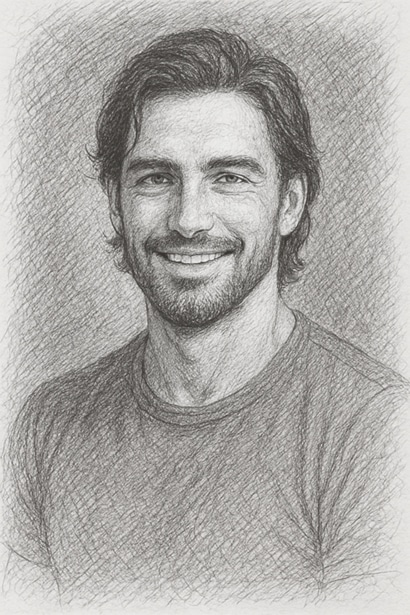
Cardinal Fabrizio Dante
Long before he had even entered the priesthood, Cardinal Fabrizio Dante had grown up a tortured child. Not literally tortured, but in the sense of striving for individuality in a typical Italian household with too many children, fighting for love and affectionany type of attention he could manage to wrangle out of his hard-pressed parents and “ungrateful siblings,” as he once told a teacher: ”And why shouldn’t I think that way?” he pleaded. “They’re lucky to have me as a brother.”
After World War II, Guglielmo and Isabella Dante had done their civic and religious duty, producing children in abundance like the good Catholics they were. Providing for their nine children was a struggle, for both of them also had to run the family’s lively trattoria day and night, situated on the street front of their modest home in the working class neighborhood of Trastevere, near Rome’s Piazza di San Calisto, not far from the Vatican’s thousand-year-old walls.
Dante turned to the priesthood early in life, not so much as the result of a calling but as a way to get out of the house, and to pave his own way to the power he observed in the hands of Rome’s elder clergy, with their fancy palazzos and Mercedes Benz’s. He knew he could thrive in the upper echelons of the Vatican, and every move he made as a priest was laser-focused on that single objective. Who knew? One day he might even be Pope.
Eventually now-Cardinal Dante did reach the marbled halls of power within the Vatican—as its Secretary of State, the second most powerful position after the Pope himself. That office enabled him to run Vatican City in his own fashion, with an aggressive and obligatory hand (the obligations being in his favor). Over time he had dispensed a great deal of patronage, accommodations which cost him nothing yet yielded an equal amount of tangible debts in return. That’s how real power was earned, Dante knew, and most every cardinal and bishop inside the Vatican—as well as its far-flung territories—was indebted to Dante for one indulgence or another.
Dante was not the kind of man one wanted to have as an enemy.
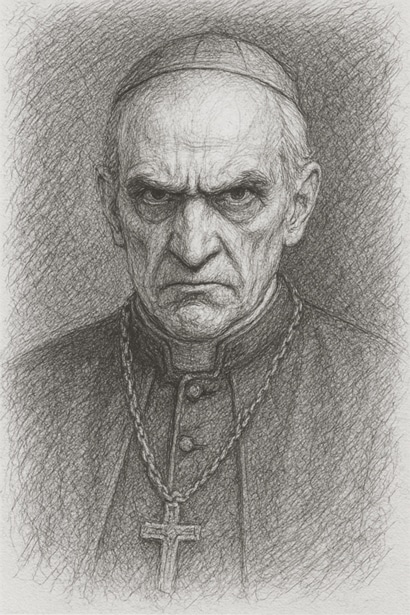
Cardinal Giovanni Severino
Having replaced Fabrizio Dante, Cardinal Giovanni Severino is the current Vatican Secretary of State, the second most powerful man in the Catholic Church after the pope himself. As the chief architect of the Holy See’s diplomatic and political machinery, Severino’s reach extends far beyond the gilded halls of the Apostolic Palace. His influence shapes not only Vatican policy, but also delicate negotiations with world leaders, international treaties, and the intricate web of relationships the Church maintains across every continent.
A master of protocol and persuasion, Severino is equally comfortable navigating tense geopolitical discussions as he is orchestrating the Vatican’s internal power balances. He commands immense respect within the Curia for his strategic mind and his ability to resolve—or contain—potential scandals before they damage the Church’s standing.
In public, Severino embodies the image of a senior prelate—immaculately tailored cassock, richly hued mozzetta, and a signet ring that catches the light when he makes a point. His manner is unhurried, his voice low but resonant, and his eyes carry the weight of a man who knows both the value and the price of information.
Behind the formality, however, lies a calculating pragmatist. Severino is known for weighing every conversation for potential advantage. In his world, trust is a currency, and he spends it sparingly.
Although Father Michael Dominic and Hana Sinclair have crossed paths with Severino in the course of their work, their relationship with him remains deliberately distant. The cardinal’s authority makes him a gatekeeper to certain Vatican resources, but his political instincts—and the secrets he keeps—mean that he seldom reveals more than he intends.
Michael and Hana, along with their close allies, are never quite sure where Severino’s loyalties lie. Is he an ally working behind the scenes to protect the Church from its enemies? Or is he safeguarding only its image, even at the cost of burying truths they are determined to uncover? That uncertainty shapes their interactions: cordial in public, cautious in private.
For those outside his inner circle, Severino remains an enigma. His public persona is one of integrity and service, yet whispers within the Curia suggest he has the instincts of a survivor—someone who can quietly shift allegiances when expediency demands. To Michael, Hana, and their team, this makes him both a potential ally and a possible obstacle.
It is not lost on them that the same qualities making him indispensable to the pope—his ability to protect the Church’s interests at all costs—could also lead him to obscure or suppress truths they are determined to bring to light.
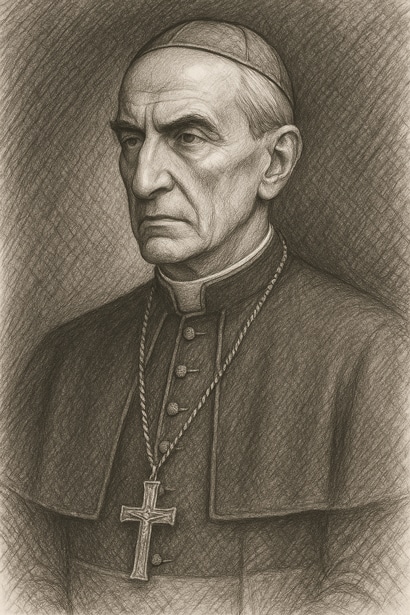
Calvino Mendoza
Brother Calvino Mendoza is a long-serving and highly trusted figure within the Vatican Secret Archives, known as much for his encyclopedic knowledge of the Curia’s labyrinthine collections as for his colorful personality. A friar with a warm, if slightly mischievous, demeanor, Mendoza blends scholarly rigor with a lively wit, often seasoning his conversations with literary allusions and historical quips. He is quick to find humor in tense situations, his chuckle—accompanied by the bobbing of his pronounced dewlap—serving as a familiar sound in the quiet halls beneath the Apostolic Palace.
Physically, Mendoza is described as having a thick neck and a sturdy build, the kind of presence that fills a room even before he speaks. He moves with surprising briskness for his age, the slap of his leather sandals echoing down the marble corridors as he guides visitors into the Archives’ shadowy depths. He is completely at home among the eighty kilometers of shelving in the vast underground repository, treating it as both workplace and sanctuary.
Mendoza’s role is central to the day-to-day operation of the Secret Archives. He has an unmatched facility for locating obscure manuscripts, papal decrees, and Curial records, particularly from the less-frequented Miscellanea section. Over decades of service, he has developed an intuitive understanding of the Archives’ inner workings, from the ancient classification systems to the political sensitivities surrounding certain documents. This insight extends to the human landscape of the Vatican as well—he knows who can be trusted, who must be handled with caution, and whose influence should never be underestimated.
He serves as a valuable mentor and ally to Father Michael Dominic, offering both practical guidance and candid warnings about the personalities who inhabit the higher echelons of Church authority. Mendoza is forthright in his counsel, cautioning Dominic about those, like certain cardinals, who maintain networks of informants throughout the Vatican—“spies,” as he bluntly calls them—operating as much from fear as from loyalty. His advice is often couched in scriptural references, delivered with the ease of someone who has spent a lifetime weaving faith into daily life.
Despite his geniality, Mendoza is no stranger to discretion. He understands that survival in the Vatican’s complex political environment requires both integrity and prudence. Though deeply committed to truth, he knows there is wisdom in how and when that truth is revealed. This combination of moral grounding, institutional savvy, and a touch of irreverence makes Brother Calvino Mendoza one of the most indispensable—and quietly influential—figures in the Vatican’s hidden world.
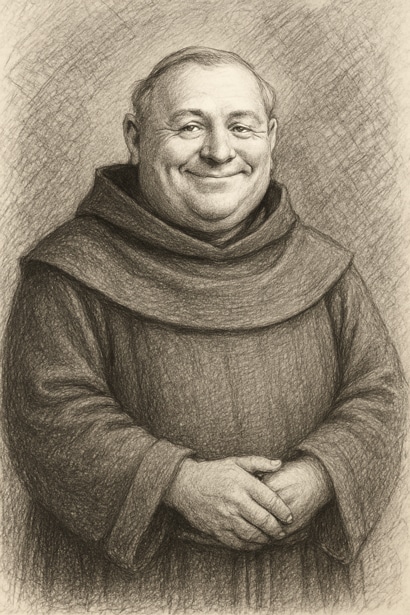
Massimo Colombo
Massimo “Max” Colombo serves as the Director General of the Agenzia Informazioni e Sicurezza Interna (AISI), Italy’s powerful domestic intelligence service headquartered in Rome. In a role comparable to “M” in the James Bond universe, Colombo is the discreet but commanding figure at the helm of a sprawling national security apparatus with deep connections to Interpol and intelligence agencies across Europe, North America, and the Middle East. From counterterrorism operations in Sicily to clandestine cyber-intelligence units in Milan, his reach and influence span Italy’s most sensitive security matters.
Hana Sinclair first met Max at an investigative journalism conference in Rome, an unlikely setting for the leader of Italy’s most secretive agency. Their initial conversation—sparked by a discussion on press freedom and the ethical boundaries between journalism and national security—evolved into a genuine, mutual respect. What began as a chance meeting quickly became a trusted friendship, strengthened over years and tested in moments of quiet urgency.
Since that day, Colombo has served as a discreet conduit for select declassified intelligence, offering Hana and Father Michael Dominic timely insights or background information vital to their investigations. These exchanges are never casual; Max is a master of calculated disclosure, revealing only what serves the greater good—or, in rare cases, what his conscience compels him to share, even if it skirts official protocol. In doing so, he walks the razor-thin line between safeguarding Italy’s security interests and aiding two people he has come to trust implicitly.
Max’s manner is cool, deliberate, and unflappable. A career intelligence officer who rose through the ranks from field operative to director, he exudes a calm authority forged through decades of navigating political intrigue, high-stakes operations, and the perpetual chess game of international espionage. His sharp mind is matched by an instinct for reading people—a skill he applies as much in quiet conversations over espresso as in tense, closed-door briefings with ministers and foreign dignitaries.
His professional relationship with Michael Dominic is one of mutual respect: the priest recognizes Max’s formidable skill and intelligence, while Max appreciates Michael’s unwavering moral compass and strategic mind. While the Vatican and Italian intelligence often operate on parallel—but separate—tracks, Max’s rare willingness to collaborate with outsiders marks him as a man who values truth and justice over politics when the stakes demand it.
Ultimately, Max Colombo is a figure of quiet power—an operator in the shadows whose influence extends far beyond Italy’s borders. In the dangerous interplay between truth-seekers and those who would bury the past, he is an invaluable ally, a measured strategist, and a man who knows exactly how much information to release… and when to release it.
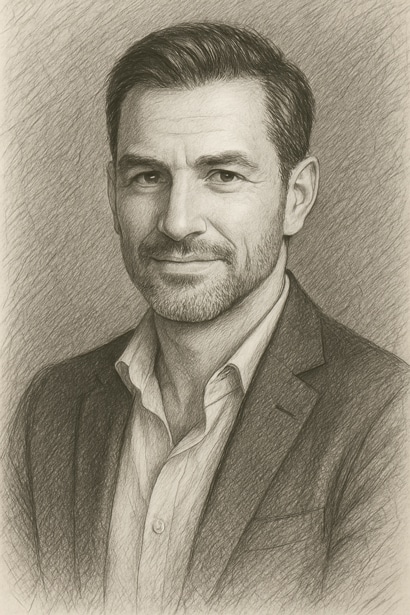
Sister Teri Drinkwater
Sister Teresa “Teri” Drinkwater, the resourceful and sharp-minded administrator of the Vatican’s complex communications systems, is an intriguing character whose distinctive blend of intelligence, dry humor, and quiet moral strength makes her indispensable within the series. As head of both the Vatican’s internet and telephone switchboard operations, Teri is at once the technological guardian and trusted gatekeeper of the Holy See’s most sensitive information, often operating discreetly behind the scenes with profound efficiency and insightful expertise.
Far more than just a technical specialist, Teri—a member of the Pauline religious order of nuns—embodies a rare combination of modern technical brilliance and traditional spiritual devotion, uniquely bridging the gap between ancient religious institution and contemporary digital realities. Her profound technical skills frequently place her at the center of the team’s investigations, allowing her to maneuver skillfully through the digital intricacies of cyber threats, surveillance, and encrypted communications—challenges that often prove vital in helping Father Michael Dominic and investigative journalist Hana Sinclair unravel complex mysteries.
Sister Teri’s personality is marked by quiet strength, independence, and understated wit. Her humor, dry and deeply intelligent, often serves to subtly defuse tension, providing moments of levity precisely when needed most. Her insightful observations, rooted equally in faith and intellect, enrich interactions with her colleagues, especially her trusted allies Michael Dominic, Ian Duffy, and Swiss Guards Karl Dengler and Lukas Bischoff. Her thoughtful remarks and gentle teasing underscore a deeply humane side to her disciplined professional exterior.
Deeply respected and trusted by her companions, Teri often serves as a grounding voice of reason amid the high stakes and dramatic revelations that characterize their missions. Her steady presence, logical pragmatism, and quiet confidence in her abilities provide reassurance and strength to those around her. She frequently offers crucial guidance, supporting Michael and Hana with a moral clarity sharpened by her own profound spirituality and intellectual rigor.
Despite her formidable technical proficiency, Sister Teri is also portrayed as profoundly human, capable of vulnerability and compassion. Her friendships, particularly her warm rapport with Ian Duffy, reflect genuine emotional bonds rooted in mutual admiration and professional respect. Their shared moments of intellectual camaraderie, witty exchanges, and collaborative teamwork lend warmth and authenticity to their interactions.
Sister Teri’s role frequently places her at ethical crossroads, compelling her to grapple with the delicate balance between loyalty to the Church’s traditions and her deep commitment to transparency, justice, and truth. Her ability to skillfully navigate these difficult choices, guided by a firm yet nuanced moral compass, underscores her complexity and depth as a character. Her courage under pressure, steadfast resolve, and quiet heroism resonate profoundly with readers, highlighting her strength and integrity even when confronting powerful adversaries determined to suppress inconvenient truths.
Ultimately, Sister Teresa Drinkwater is a character who seamlessly blends spiritual devotion, technological mastery, quiet humor, and profound humanity. Her presence enriches the narrative with wisdom, warmth, and unwavering strength, serving as a compelling reminder that true heroism often lies in thoughtful resilience, ethical courage, and the quiet determination to uphold truth in a world filled with secrecy and moral ambiguity.
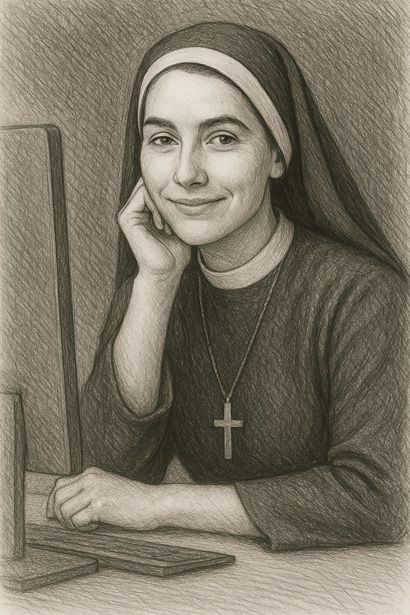
Ian Duffy
Ian Duffy, assistant archivist to Father Michael Dominic within the Vatican Secret Archives, is a captivating character whose intellect, wit, and unwavering loyalty make him an essential and beloved figure within the intricate world of Vatican intrigue. Tall, red-haired, and unmistakably Irish, Ian is not merely Michael’s assistant but a trusted confidant and friend, often serving as a grounding influence amid the complexities and dangers of historical investigations and secretive power struggles.
A scholar at heart, Ian is sharp-minded, quick-witted, and deeply knowledgeable about archival secrets, obscure texts, and Church history. Though he is not himself a cleric, his scholarly dedication and reverence for truth perfectly align him with Michael Dominic’s quest for historical accuracy and ethical clarity. His meticulous attention to detail, resourcefulness, and analytical skills often prove indispensable in unraveling cryptic documents, hidden codes, and ancient conspiracies.
Ian’s personality is marked by warmth, humor, and an easy-going charm that immediately draws people to him. His humor, often pop-culture-oriented, clever, and delightfully irreverent, frequently provides necessary levity even in tense and dangerous moments. Ian’s ability to inject wit and a sense of calm into challenging situations makes him a beloved companion among allies such as Michael Dominic, Hana Sinclair, Sister Teri Drinkwater, and the Swiss Guards Karl Dengler and Lukas Bischoff.
However, beneath Ian’s easy-going exterior and humorous banter lies an emotional depth and sincerity that readers come to deeply appreciate. He is intensely loyal, empathetic, and compassionate, qualities especially evident in his genuine concern for the well-being and emotional states of those around him. His unwavering commitment to Michael and Hana’s mission, despite the personal risks involved, underscores a moral fortitude equal to any of the Vatican’s elite.
Ian’s inner journey frequently intersects with complex ethical dilemmas that challenge his principles and test his resolve. As he helps uncover suppressed documents and explosive revelations, Ian is forced to navigate treacherous institutional waters and confront powerful adversaries determined to silence inconvenient truths. His courage and dedication to truth-telling—no matter the personal danger—reinforce his character’s central importance within the narrative.
Beyond his professional role, Ian’s friendships deepen the emotional landscape of the stories. His camaraderie with Michael and playful rapport with Hana create authentic emotional bonds that enrich every adventure. Additionally, his enduring friendship with Sister Teri, with whom he shares both intellectual banter and mutual professional respect, adds layers of emotional complexity and genuine warmth to their interactions.
Ultimately, Ian Duffy embodies the steadfast courage and unwavering moral integrity required to pursue truth in a world that often seeks to conceal or distort it. His character—marked by intellectual rigor, heartfelt sincerity, quick humor, and quiet bravery—resonates deeply with readers, making him an unforgettable figure within the compelling tapestry of Vatican intrigue, historical mystery, and philosophical exploration.
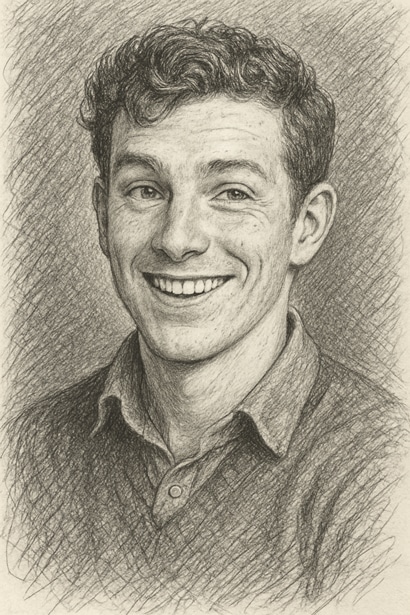
Javier Batista
Born in Buenos Aires, Argentina, Javier Batista has been an Interpol agent with that city’s National Central Bureau for some thirty years. He deals primarily in money laundering and human trafficking across Argentina’s notoriously porous borders, as well as counterintelligence operations involving the smuggling of drugs and firearms. His work often places him at the intersection of organized crime and international espionage, and he is closely connected with Israeli Mossad. Some say he was once a member of the elite Israel Defense Forces’ Shayetet 13 commando unit—a rumor he neither confirms nor denies.
As an Operations Specialist for the NCB’s Command and Coordination Center, Batista has long been involved in international fugitive investigations, forensic and criminal analysis, and intelligence-sharing with allied agencies. He became the Bureau’s foremost authority on tracking the rise of neo-Nazi movements in South America, particularly as they involved Argentine nationals. His personal history—Argentinian father, and a mother from a long line of Ashkenazi Jews who settled in Argentina from Spain in the early nineteenth century—gives him a unique perspective on the bitter ironies of history. In a twist of historical irony, as he often reminds colleagues, post–World War II Argentina held the largest populations of both Jews and Nazi immigrants in Latin America.
Highly disciplined yet personable, Batista is known for his sharp instincts, dry humor, and a deep sense of justice. His association with Mossad is never discussed—true to that agency’s culture of silence—but those who know him best understand that his loyalties, while fiercely Argentine, are also bound to a broader fight against intolerance, extremism, and the shadow networks that threaten civil society. In the field or behind the desk, Batista remains a man who blends methodical precision with a willingness to act decisively when the moment demands it.
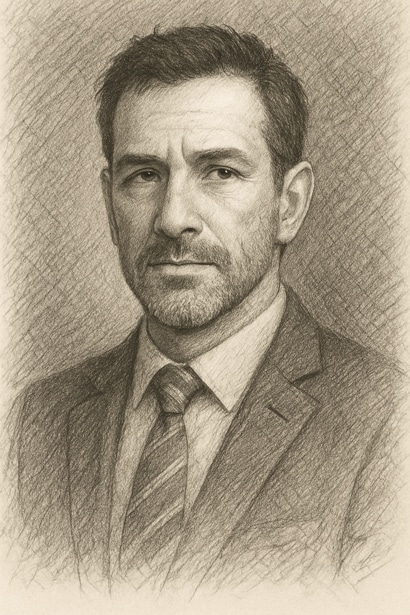
Gunari, Milosh, and Shandor Lakatos
Coming from a long line of European Roma gypsies, Gunari Lakatos, and his two sons Shandor and Milosh, live on the distant outskirts of Chamonix-Mont-Blanc in France, in the tiny hamlet of Les Pèlerins, a picturesque alpine village off the beaten path of most tourists.
On the southernmost fringe of Les Pèlerins, at the very base of the Alps, several squalid camps of lean-tos and plastic-sheeted tents served as home to the ragged band of nomadic gypsies, more generally called “travelers” throughout much of Europe. Gunari Lakatos was their voivode, or chieftain.
Originating from India, the Roma arrived in Eastern Europe around the tenth century, mainly settling in Romania and Bulgaria but migrating to many other European countries as travelers simply sought work and freedom from persecution. They are considered outcasts in every country they go to, and when their camps and populations grow large enough to be a distraction to locals, police are sent in to evict them and destroy their shabby homes, often deporting many back to Romania.
Shandor and Milosh Lakatos, two brothers born and raised in various nomadic communes in the Alps, did what work they could find to support their parents and the community. But gainful work opportunities for gypsies were hard to find. No one wanted their kind, for Roma were widely perceived as filthy beggars and thieves, not to be trusted, and thus, unemployable. So, as for many underprivileged and oppressed cultures, crime was their only option to survive.
Shandor’s younger brother Milosh was the clever one in the family. His tactics for begging and eliciting handouts from tourists were always the best, and they paid off handsomely. He had learned to easily pick the pockets of tourists on the streets of Chamonix, where he and Shandor did most of their work. He fielded a constant supply of cell phones, watches, wallets, and other items people kept on them and which were easily liftable, all of which they fenced through a network of other travelers higher up the chain of Roma operators who worked the larger cities. They often kept many of the treasures they “found,” such as the new unlocked iPhones both brothers now enjoyed after working a particularly rich crowd in one of the ski lodges.
Milosh was also mechanically inclined, able to fix broken radios and other electronics he and his brother found in trash bins. He also knew something about cars—mainly how to break into them and score their biggest trophies, which they quickly fenced through the upline Roma syndicate.
Having enjoyed an adventure or two involving the Lakatos family, Father Dominic knew he could count on them when needed, and the boys came in very handy when certain methods were required which a Catholic priest could hardly be complicit in…
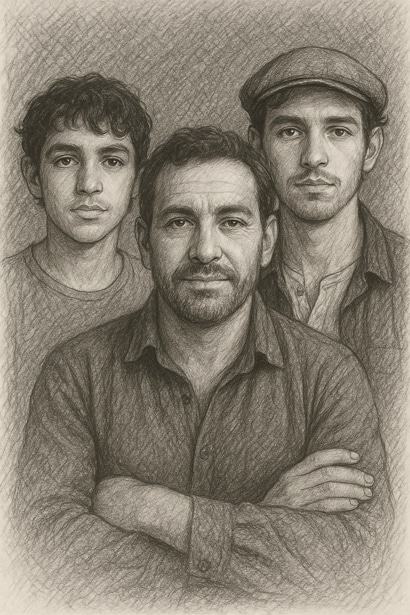
Vincenzo Tucci
Among the more respectable antiquities dealers in all of Rome, Vincenzo Tucci was a quiet, portly man, with a veal-white complexion made all the more spectral by a severe case of alopecia. Not even a hint of hair appeared on his face or head, and the lack of eyebrows and lashes gave him the one advantage of looking far younger than his seventy-five years, though it often earned longer than polite stares from the otherwise well-mannered set of affluent clients who entered his shop on the Via del Governo Vecchio.
Tucci was known throughout Italy as an expert in Etruscan art. His shop was packed with statues, bronzes, vases, jewelry, glass objects, and numerous other fine antiquities appealing to discerning collectors worldwide, who often called for right of first refusal on especially rare and previously unseen artifacts that might fall into his hands.
But Vincenzo Tucci also wore another, lesser known hat atop his bald pate—that of capo zona to the tambaroli of Rome—the regional head of black market tomb raiders, whose work often kept Tucci busier than his legitimate business. He possessed a keen eye for ethical loopholes which had, up to now, kept him at arm’s length from legal complications.
As it has been for generations, the black market for antiquities in Italy is a thriving enterprise. Long before artists of the Renaissance began producing renowned works on canvas and marble, artisans of ancient Greece and other old world cultures before the common era spawned industries turning out works of stone and bronze, of terracotta pottery and marble vases. And while much of this heritage had found its way to museums, it had long been presumed that private collectors by far owned the vast majority of works, much of which possessed dubious legal provenance.
The tambaroli maintained a distinctly secret list of potential fences for items they acquired, and befitting his role as capo zona, Tucci usually got the first call when anything of particular intrigue came on the market. And he, successively, had the singular resources to whom he could turn for authenticating or effectuating the sale of such an item.
